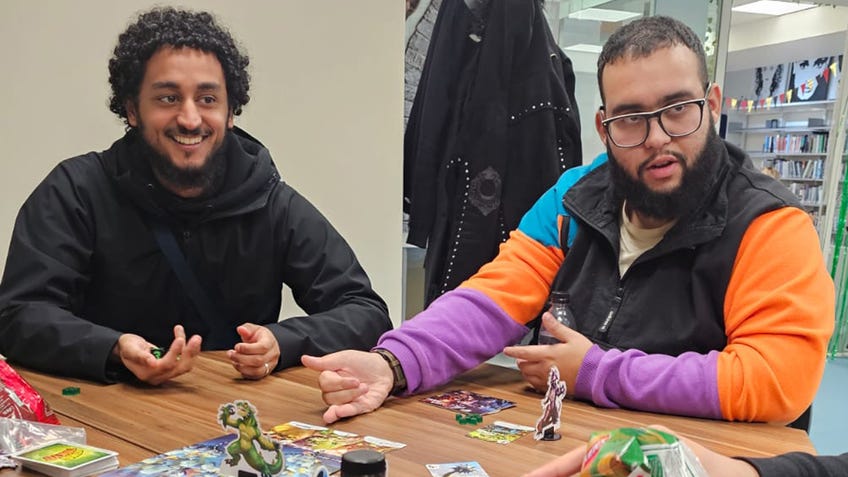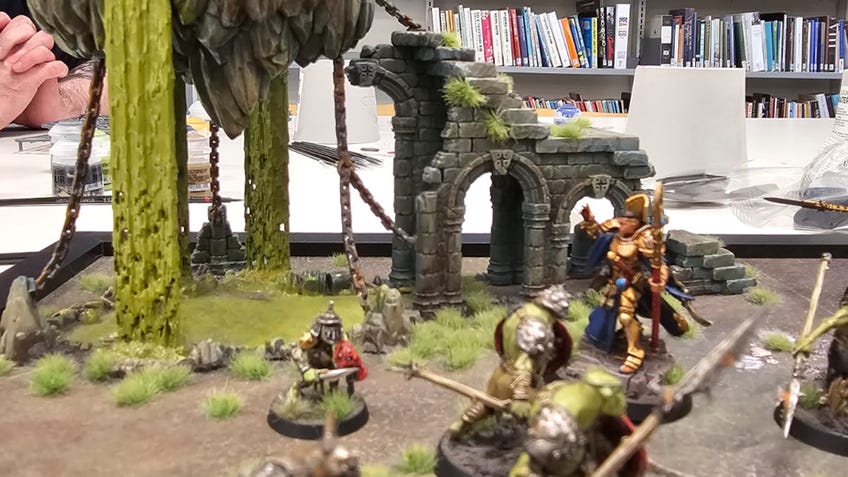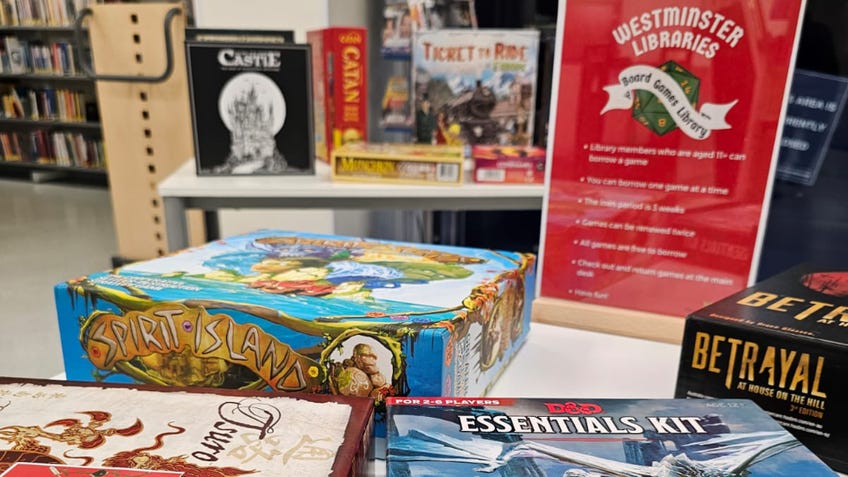“All the benefits of reading also apply to board games”: Why more libraries are adding tabletop classics to their bookshelves
From Wingspan to D&D, local libraries are expanding their catalogues of cardboard.
It's a Thursday evening a few days before Christmas, and a few metres away from the busy shops on Kensington High Street in central London, three bears are failing to rob the launch of a high-tech honey trade show. One is having a nervous breakdown, backstroking in a sea of catering honey, while another has successfully seduced Miss Honey World (a bee) and is driving off with her in the first bear's getaway Uber. At another table there's a loud session of Cockroach Poker, and someone is trying to rally players for an intro to Dungeons & Dragons.
While it's unusual to find loud sessions of Grant Howitt's Honey Heist RPG being run in a public library, these days it's not uncommon for such places to host games sessions. This evening is more than that: Westminster Libraries, which shares a library service with Kensington, has a range of modern board games and RPGs in its lending collection, available for users to borrow and take home for up to a month at a time. The scheme went live in November and so far uptake has been strong, with both mainstream favourites and hobby games - the first game to be borrowed was Wingspan, and every title has been taken out at least once.
"The focus of the collection is really 11-plus, but there are things in it like Dobble and Sushi Go! that younger kids could play with their families," says Lucy Gill, project manager of the Games Lending Library. "We wanted to show people that games are not something that you abandon when you're eleven, that they're more challenging."
It isn't just board games either. "We're doing some RPGs," Gill continues. "In a way they are a little harder to lend because although a lot of them are books, if you borrow a campaign book, you're probably going to want it for a very long time. So we're still trying to work out how that fits with the egalitarian principle of the library lending model. But I was quite surprised that a lot of young people want to play D&D."
Although Gill and her team distributed leaflets at Dragonmeet, London's annual games convention in December, their primary focus is, as she suggests, the youth. Schools and community centres in the area reported that after Covid and lockdown, kids were displaying behavioural issues, possibly as a result of missing the social interaction they'd normally have had with their peers. Games provide a safe environment to learn and practise social behaviours inside what sociologist Johan Huizinga called "the magic circle", the this-isn't-real bubble of immersion that surrounds games players.
"The executive director of the borough's Children's Services is a gamer herself," Gill explains. "She went to a community centre in Westminster and there were kids there, teenagers, who were on the verge of exclusion from school because of their behavioural issues. Playing the games had had a really positive effect on their behaviour. There's a body of research showing these positive impacts. Particularly structured things like Warhammer and RPGs seem to really work for certain kids."
We wanted to show people that games are not something that you abandon when you're eleven, that they're more challenging.
With the director's help the project was driven forward and won a bid for funding from Public Health England. A scheme like this needs to cover more than the cost of the games; staff time, training and running events in the library all require budgets, but it seems to be paying off.
"This year we want to branch out into more focused events for teenagers," Gill says. "We really want to offer something for these age groups where there may not be so much about. But our launch events have been all-ages because the library is for everyone, and that's shown us there is a wider audience. So, definitely, we would be interested in broadening it."

Westminster's scheme may be the most high-profile in the UK so far, but it's not the first. Sheffield Libraries has been lending games for a while, and Newcastle Libraries launched a similar scheme in early 2018. It's been a considerable success; having started with just 30 titles and a budget of £1,000, the library now has a collection of around 350 different games. "They kept giving us money," Patrick Stringer, the library and information officer who co-created the Newcastle scheme, says. "It's a relatively small proportion of the library stock budget."
Stringer and two colleagues had heard of libraries lending games and, rather than just talking about it, decided to make it a reality with the aid of a library manager who, as in Westminster, was also a gamer. They had no roadmap for how to set up a scheme like this.
There were kids on the verge of exclusion from school because of their behavioural issues. Playing games had a really positive effect on their behaviour.
"We just worked it out for ourselves," he says. "There was some information online, mostly from American public libraries and colleges," but that didn't cover the practicalities of how to catalogue, shelve and lend games, most of which they had to devise on their own. They quickly worked out a number of tricks: scrap box inserts, put everything in bags, include a contents list in the box, and don't get upset if games come back dented or incomplete.
"When you're lending items, sometimes they're going to be damaged or bits are lost. We already lend out books that are £50, 60, 70," he says. "Most games we get a good number of issues out of before there are any problems. Publishers have been very good about sending replacement parts."
The main problem they've found is that people aren't as respectful about the loan period on games as they would be on books, sometimes hanging onto them for three or even six months. Stringer has one major regret: an early acquisition for the library was the Fantasy Flight Games edition of Fury of Dracula, a game he wanted to try himself, but the first person to borrow it never brought it back.

After a conference where he spoke about the success of the lending scheme, Stringer met more librarians interested in following suit, and word has been spreading, along with ideas about best practice, what's been found to work and what doesn't. He has helped several other libraries to start similar schemes, including Gill and her colleagues at Westminster Libraries, and is happy to advise others.
"Games are a good fit for libraries," he says: they're good for adults and children, they offer social interaction in a safe space, and there are positive educational aspects too. "All the benefits of reading also apply to board games." Like Westminster, Newcastle has been running events in-library alongside its lending collection, with social deduction games Werewolf and Blood on the Clocktower proving particularly popular.
Not all libraries are as enthusiastic about games; while the British Library has a copy of every book published in the UK, its board game collection extends to a few examples from the 18th and 19th centuries, and you can't borrow them. But even that august institution hosted a games event in its lobby in December as part of its exhibition on fantasy in literature, with a good range of modern titles and a healthy attendance.
If the greatest library in the country can see the benefits of bringing games into its spaces, it's hard to deny their place alongside books, CDs, DVDs and other items that your library card let you borrow. Just don't run off with the copy of Fury of Dracula.

